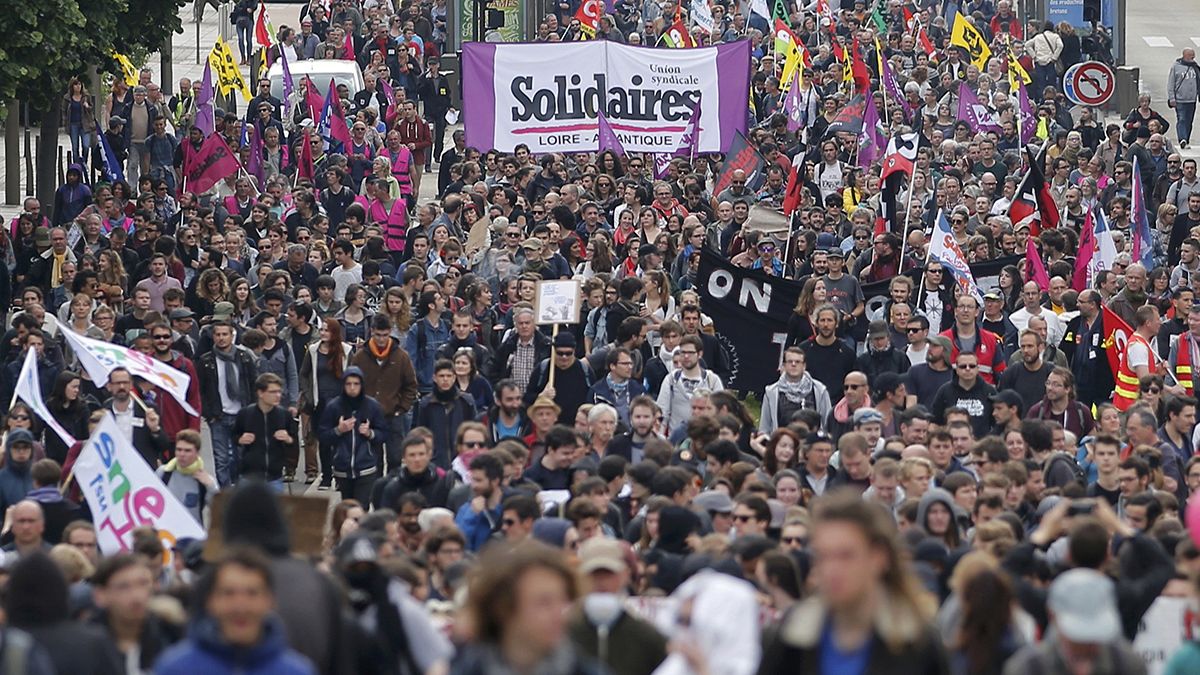The country faces a week of stoppages and protests as unions mobilise their members to protest against employment law reform.
- Lorry drivers block main cities
- Street protests planned
- Train, plane workers also involved
- “I will not give in” – Hollande stands firm
Lorry drivers are blocking main roads around some major cities in France.
There are protests around the southern city of Marseille. 50 drivers gathered in the industrial area of Vitrolles before moving on to Fos-sur-Mer, part of the city’s commercial port.
They are protesting against a planned reform of the country’s employment legislation.
#Grève : les routiers partent de #Vitrolles pour #Foshttps://t.co/KMDuOMSmnlpic.twitter.com/UVkHBVET5R
— La Provence (@laprovence) May 17, 2016
VIDEO – Loi Travail: les routiers entament leur grève un peu partout en France https://t.co/X7dw9cJ496pic.twitter.com/hASG4evVem
— BFMTV (@BFMTV) May 17, 2016
Truckers fear a drop in income because the new labour bill cuts overtime pay.
The western cities of Nantes and Le Mans are also affected.
Marches are planned in Paris and other major cities during Tuesday.
What are they angry about?
They are protesting against a planned reform of the country’s employment legislation which would mean working longer hours.
The proposal would allow employers to opt out of the obligations of national labour law – sacrosanct in France – and set pay and conditions at company level.
Opponents say this would undermine labour protection rules to an unacceptable extent.
How long will the strikes go on?
En quoi les mesures de la loi El Khomri vont-elles changer la vie des salariés ? > https://t.co/AGHWzkBy2Rpic.twitter.com/OZU0DJsjKl
— RTL France (@RTLFrance) May 17, 2016
France is facing a fresh wave of strikes and other union action against the bill, known as the “El Khomri” law after the minister who has introduced it.
The hard-line CGT union has called for a week of rolling strikes by rail workers, dockers and airport staff as well as street protests on Tuesday and Thursday.
This week has been billed as “make-or-break” for the protest movement.
What has been the response from the government?
President Francois Hollande, whose popularity is at an all-time low, is standing firm.
“This law will be passed,” Hollande said in a radio interview on Tuesday morning. “I will not give in, despite the difficult circumstances. Too many governments have given in, thats why the country was in the state we found it in in 2012.”
“A compromise has been reached, a balance has been found, the pro-reform unions and the majority of Socialist supporters are behind this reform.”
Hollande also said that since protests began earlier this year:
- +1000 protesters have been arrested
- +300 people have been hurt
Do a lot of people back the protests?
Initially they did, yes.
However, the latest official estimations suggest numbers are dwindling.
Hollande’s government has watered-down the initial proposal. Last week, ministers controversially decided to bypass parliament to push the legislation through.
Find out how the French police estimate the numbers here (in French)
What they are saying
“I have been working for 25 years. If this law passes, I will lose between 150 and 200 euros each month from my pay packet. This adds up to 1,000 to 1,500 euros a year,” – Lorry driver John Bosco explains why he is angry.
“The goal is to paralyse the traffic and the trucks, to block the economy in order to get the message across that our mobilisation is growing,” – Laurent Casanova, the head of the local transport union, explains what the protesters hope to achieve.


